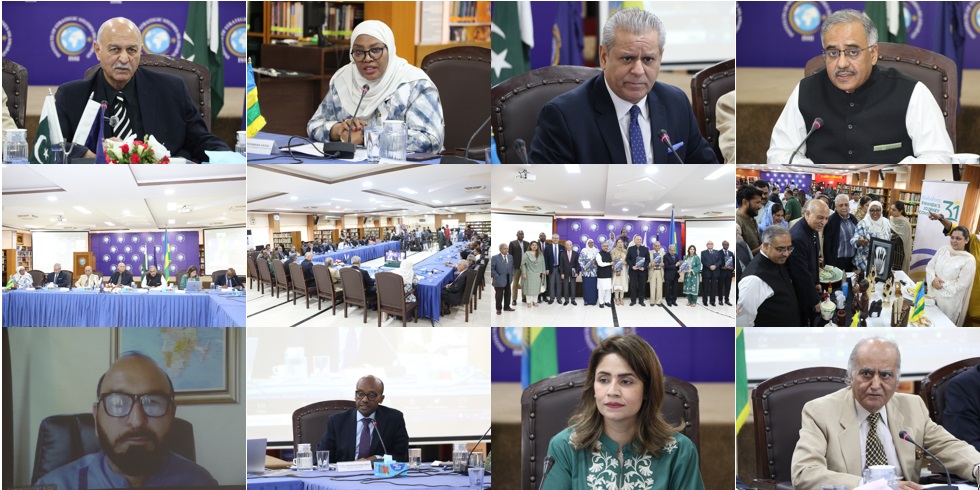PAKISTAN’S VISION FOR A GREENER FUTURE RISE OF ECO-CONSCIOUS PLANTATIONS
Dr. Muhammad Shahzad Ashfaq
Post-Doctorate (Peace Education)
International Islamic University Islamabad
Pakistan a land of mountains and natural beauty of glaciers facing pressing environmental challenges ranging from deforestation to air pollution. The motherland has begun to envision a greener future through the promotion of eco-conscious plantations. Plantations are vital role in maintaining ecological balance mitigating the effects of climate change and fostering sustainable development. Pakistan’s vision for a greener future specially focusing on the of eco-conscious plantations as a key strategy to combat environmental degradation. The nation recognized the urgency of addressing environmental issues and has taken significant steps to promote eco-conscious plantations.
One of the primary motive behind this vision is the need to take up deforestation which has been a major concern in the country. Deforestation not only leads to loss of biodiversity but also contributes to soil erosion, reduce water quality and increase in greenhouse gas emission. The vision of Pakistan aims the rise of eco-conscious plantations to reverse the trend of deforestation and restore degraded ecosystems. Furthermore, eco-conscious plantations play a crucial role in mitigating the impact of climate change. Trees absorb carbon dioxide from the atmosphere helping to reduce greenhouse gas concentrations and combat global warming.
The expansion of forest cover through sustainable plantations, Pakistan can contribute to international efforts to curb climate change or meet its commitments under the Paris Agreement. Forest act as natural carbon sinks, storing carbon and offsetting emission from various sources. Pakistan has recognized the economic potential of eco-conscious plantations. Sustainable forestry practices not only contribute to environmental conservation but also offers economic benefits to local communities.
Pakistan is facing environmental challenges including air pollution, deforestation and climate change impacts. The country need to increase its forest cover through sustainable plantations. The Paris Agreement and the United Nations’ Sustainable Development Goals, an international treaty aimed at limiting global warming to well below 2 degrees Celsius and emphasizes the importance of afforestation and reforestation in reducing greenhouse gas emissions. Through proper implementation of sustainable forestry practices Pakistan can contribute to these global efforts and align itself with the goals of Paris Agreement. Sustainable plantation offers a range of environmental, social and economic benefits.
In Pakistan the expansion of forest sequester carbon dioxide from the environment and increase fresh air to mitigate climate change. Moreover, forests are home to a diverse range of plant and animal species many of which are threatened by deforestation and habitat destruction. Although creating new forest habitats through plantations Pakistan protect endangered species, preserves ecological balance and strengthen the resilience ecosystems against climate change impact.
The country is taking significant steps to address these challenges and protect its natural heritage. Pakistan has made considerable efforts in protecting endangered species. The country is home to a diverse range of wildlife including the iconic snow leopard, the Indus river dolphin and the Markhor, the national animal of Pakistan. The species face threats from habitat destruction, illegal wildlife trade and climate change.
Pakistan has established protected areas and wildlife sanctuaries where endangered species are given refuge and monitored for conservation purposes. Different areas are designed under various conservation law and regulations to ensure the sustainable management of their habitats and the protection of these species residing within them.
One such example is the Deosai National Park, located in the northern area of Pakistan which serves as a sanctuary for the endangered Himalayan brown bear. The park’s unique ecosystem provides a safe habitat for these bears, allowing them to breed and multiply without the threat of human interference. In terms of preserving ecological balance, the motherland recognizes the importance of maintaining a harmonious relationship between human activities and the environment. However, while it emphasizes the need for coexistence between humanity and nature, it lacks specificity regarding how this harmony can be achieved. A mere acknowledgment of the relationship does not address the complexities involved in balancing economic development with ecological preservation. The country has implemented various policies and regulations to promote sustainable land for reduce pollution.
This anthropocentric framing risks prioritizing nationalistic sentiments over global ecological responsibilities. A more effective discourse would involve interdisciplinary approaches that integrate scientific research with community engagement to foster genuine environmental stewardship. Ultimately, while the assertion is commendable in its intent, it necessitates a more nuanced exploration of practical strategies and frameworks to facilitate sustainable practices. Only through comprehensive planning and inclusive dialogue can we hope to achieve true ecological balance.
Pakistan’s focus on eco-conscious plantations serves as a model for addressing environmental challenges while fostering socio-economic growth. Pakistan’s commitment to eco-conscious plantations exemplifies a progressive approach to tackling environmental challenges while simultaneously fostering socio-economic growth. The nation has recognized the detrimental effects of deforestation and climate change, leading to initiatives such as the Billion Tree Tsunami, which not only aims to restore ecosystems but also creates employment opportunities. Prioritizing reforestation, Pakistan demonstrates that environmental sustainability can be integrated with economic development.
Moreover, these plantations serve as a catalyst for community engagement and empowerment. Local populations are involved in planting and maintaining trees, instilling a sense of ownership and responsibility toward their environment. This participatory model not only enhances biodiversity but also promotes social cohesion as communities unite for a common cause. Additionally, eco-tourism generated from these green spaces can stimulate local economies further. A greener future is not just a vision; it is an imperative that demands immediate action from all sectors of society.




